
|
![]()
Greatest Films of the 1950s
1950 | 1951 | 1952 | 1953 | 1954 | 1955 | 1956 | 1957 | 1958 | 1959
Title Screen Film Genre(s), Title, Year, (Country), Length, Director, Description 


All That Heaven Allows (1955), 89 minutes, D: Douglas Sirk


Artists and Models (1955), 109 minutes, D: Frank Tashlin
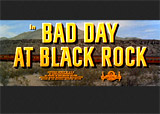



Bad Day at Black Rock (1955), 81 minutes, D: John Sturges
A suspenseful, powerful, 50's, Western-like drama, a mystery-thriller set in an isolated, southwestern desert town in 1945, and based on Howard Breslin's novel. A mysterious, one-armed veteran John J. MacReedy (Spencer Tracy) arrives in the tiny town of Black Rock by train, to fulfill a promise made to a Japanese-American soldier who died fighting in WW II. He searches for the whereabouts of the local Japanese-American father, Komoko, of his soldier/friend who saved his life, to bestow the deceased man's posthumously-presented medal of honor to the family - but encounters only a conspiracy of silence. His awkward questions cause the uneasy, hostile local inhabitants to confront their guilty consciences and threaten his life , led by menacing, sinister town boss Reno Smith (Robert Ryan) and his henchmen - a racially-prejudiced Coley Trimble (Ernest Borgnine) and Hector David (Lee Marvin). They retaliate with violence, putting his life at risk. Some town members, including a drunken sheriff (Dean Jagger), a doctor (Walter Brennan), and gal in town (Anne Francis), become the stranger's allies.

Blackboard Jungle (1955), 100 minutes, D: Richard Brooks
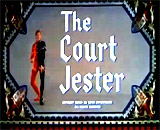


The Court Jester (1955), 101 minutes, D: Melvin Frank and Norman Panama





The Court-Martial of Billy Mitchell (1955), 100 minutes, D: Otto Preminger
This biographical war drama, a true story, was set in the mid-1920s. Stubborn but dedicated military airman Gen. Billy Mitchell (Gary Cooper), a WWI hero, was a prophetic visionary who proposed the expansion of airpower during future military combat, but his crusading recommendations to the US War Department were continually overlooked and ignored. He also argued for upgrading the fleet of airplanes left over from WWI. To make a firm political statement, in 1921, he deliberately violated military rules during a test of aircraft at an army test site off the coast of Virginia by using heavier bombs and flying at lower altitudes. He was demoted to Colonel and sent to a clerical army post in Fort Sam Houston (Texas). Meanwhile, outdated planes were continually crashing, and Mitchell lost some of his closest friends, including Lt. Cmdr. Zack Lansdowne (Jack Lord) of the Shenandoah dirigible. To publicize the problem and complain, Mitchell lobbied for a press conference, to accuse the military of criminal negligence, incompetence and treason. Predictably, he was court-martialed. Congressman Frank Reid (Ralph Bellamy) and military-appointed attorney Lt. Colonel White (James Daly) defended Mitchell, while the prosecutor was Colonel Moreland (Fred Clark), and the presiding judge was Gen. James Guthrie (Charles Bickford). Court-martialed Mitchell was tried for breaking Articles 133 and 134 of the Uniform Code of Military Justice: conduct unbecoming an officer, and conduct that discredited the military. He had definitely disobeyed the articles, but questions were raised: why, and were his accusations justified? Lansdowne's widow Margaret (Elizabeth Montgomery) testified that her husband's aircraft was a death trap. When Mitchell took the stand, he was cross-examined by special prosecutor Major Allan Guillion (Rod Steiger). He stood up to the skilled prosecutor, arguing that with the current state of the air-force, Pearl Harbor could be attacked (as it was years later). At the conclusion of the trial, Mitchell was convicted of insubordination, and suspended from active duty for five years without pay.

Diabolique (1955, Fr.) (aka Les Diaboliques), 114 minutes, D: Henri-Georges Clouzot
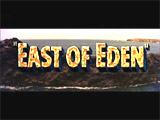

East of Eden (1955), 115 minutes, D: Elia Kazan
Director Elia Kazan's updated re-telling of the Biblical story of rival brothers, Cain and Abel and a paradise lost. A brooding James Dean - as the unappreciated son (Cain), vies against his dull, but favored stuffy brother (Abel) for the affections of their father. The maligned, misunderstood Cain character, representing the unlikeable and outcast director himself (for naming names before the HUAC Committee in 1952), becomes the sensitive hero of this film. As the poster stated, "Sometimes you can't tell who's good and who's bad!..." Writer Paul Osborn's screenplay adapted John Steinbeck's 1952 novel with the same title for this dramatic Warner Bros. film. [The film tells only a small portion of Steinbeck's work, leaving out the childhood of the parents and the Chinese character of Lee.] The CinemaScopic film, set in 1917 at a time just before the US entry into World War I, portrays the relationship between insecure, tortured, neurotic loner Caleb "Cal" Trask (James Dean, in his first major role and film) and his dutiful, favored brother Aron (Richard Davalos) - twin sons. Their father is a stern, hardened, devoutly religious, self-righteous man named Adam (Raymond Massey), a lettuce farmer living with his family in Salinas, California. The plot becomes emotionally charged when Cal expresses a liking for his brother's girlfriend Abra (Julie Harris), and then learns that his mother (Jo Van Fleet) is actually alive and operating a nearby brothel. One of the film's posters exclaimed: "East of Eden is a story of explosive passions and Elia Kazan has made it into a picture of staggering power."


Guys and Dolls (1955), 150 minutes, D: Joseph L. Mankiewicz



Kiss Me Deadly (1955), 105 minutes, D: Robert Aldrich
Aldrich's suspenseful Cold War Era masterpiece was a jarring and violent crime film that was an adaptation of Mickey Spillane's pulp fiction novel of the same name. It was the definitive, apocalyptic, paranoid, science-fiction film noir of all time - at the close of the classic noir period. The nihilistic independent film featured a cheap and sleazy, contemptible, fascistic, hardened private investigator/vigilante named Mike Hammer (Ralph Meeker) whose trademarks were brutish violence, the end-justifies-the-means philosophy and speed. The tough PI ruthlessly pursued the white-hot, deadly apocalyptic object in a mysterious 'Pandora's box' ("the great whatzit"), ultimately leading to nuclear catastrophe and annihilation. In the questing tale, he was driving late one night toward Los Angeles when he met up with an almost-naked, barefoot, trench-coat-wearing hysterical mental asylum escapee named Christina Bailey (Cloris Leachman) who was hitchhiking in the middle of the road - naked except for her trenchcoat. She was panting heavily and running down the highway. She claimed that she had been improperly detained at the institution. She claimed she was named after the poet Christina Rossetti - and her last words to Hammer were: "Remember me" (both spoken and mailed in a letter to him after her death). The two were apprehended by villainous thugs who forced them off the road, and the mysterious female was quickly tortured and killed (gruesomely with pliers semi-off-screen) by the evil pursuers, as the detective was semi-conscious. One of the villains was later revealed to be Dr. G.E. Soberin (Albert Dekker). During his own brutal pursuit of the criminals, recalling her haunting words "Remember me," Hammer was aided in his search by his sexy and limber, pimping secretary/lover Velda (Maxine Cooper), whose specialty was framing men for infidelity. In the Jalisco Hotel, Hammer came across Christina's ex-boardinghouse 'roommate' - the real femme fatale of the film. She was 'Lily Carver' (Gaby Rodgers) - a pixieish, waif-like blonde with closely cropped hair wearing a white, terry-cloth bathrobe. She was reclining in bed and had a gun pointed at his crotch, but she was a deceptive fraud. The strange young lady provided him with her false name (her actual name was Gabrielle) and was revealed to be impersonating Christina's roommate Lily Carver - whom she had killed. Hammer soon learned that Christina was a scientist who had a 'secret' regarding a radioactive explosive missing or stolen from the Los Alamos, New Mexico Nuclear Test Site. From a morgue, he retrieved a key that Christina had swallowed, leading to a locker at the Hollywood Athletic Club, where the 'great whatzit' was found. It was a leather-bound and strapped case with a searing white-hot light emanating from within. Christina had led him to an atomic, 'glowing' box containing the Great Whatsit, and a sinister conspirator Dr. Soberin - a trafficker in atomic material produced during the Manhattan Project (in Los Alamos, NM). He was one of the villains who had tortured Christina earlier. In the film's controversial, fiery melt-down climax at Soberin's Malibu beach house hideout, Dr. Soberin's betrayed accomplice Gabrielle shot him, and as he died, Soberin sternly warned: " Listen to me, as if I were Cerberus barking with all his heads at the gates of Hell, I will tell you where to take it. But don't, don't open the box." Gabrielle then wounded Hammer in the stomach after seductively commanding: "Kiss me, Mike. I want you to kiss me. Kiss me. The liar's kiss that says 'I love you' means something else. You're good at giving such kisses. Kiss me." Disobediently, she greedily raised the cover on the Pandora's box, releasing the deadly secret and incinerating herself. She became a flaring pillar of fire as it consumed her. The wounded Hammer freed the kidnapped Velda and both fled from the house. As they stumbled together into the cooling ocean waters, they watched from the beach as the house was soon engulfed with a wave of flashes, fireballs, and series of mushroom-cloud explosions.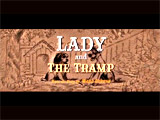

Lady and the Tramp (1955), 75 minutes, D: Disney Studio




The Ladykillers (1955, UK), 91 minutes, D: Alexander Mackendrick


Lola Montes (1955, Fr./West Germ.) (aka The Sins of Lola Montes), 110 minutes, D: Max Ophuls
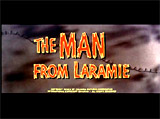

The Man From Laramie (1955), 104 minutes, D: Anthony Mann


The Man With the Golden Arm (1955), 119 minutes, D: Otto Preminger
Director Otto Preminger's code-defying, ground-breaking, powerful drama was about heroin addiction - it was the first major Hollywood film about the subject. Frankie Machine (Frank Sinatra) (known for having "arms of pure gold") as both a jazz drummer and a professional poker dealer (with a knack for lucrative card-dealing) - was also a rehabilitated prison-hospital ex-con returning to his slummy and squalid Chicago neighborhood. Determined to restore his life to order, he immediately began to fall back into old habits, including fixes of heroin from slimy dope pusher Louie (Darren McGavin), and late-night card-dealing for gambling boss Schwiefka (Robert Strauss). His greedy wife Sophia "Zosch" Machine (Eleanor Parker), faking being an invalid in a wheelchair after a car accident caused by Frankie, urged him to continue gambling, while he dreamed of being a jazz drummer. After returning to his addiction, Frankie lost all hope, but was helped by sympathetic bar hostess/mistress Molly (Kim Novak) to go "cold turkey." In the twisting ending, when Louie discovered that Zosch wasn't an invalid, she pushed him down a stairwell, then blamed Frankie for the crime. When Zosch was confronted again and revealed as a fraud, she committed suicide by jumping off a balcony to the street below, thereby freeing Frankie to possibly live a cleaner life.

Marty (1955), 91 minutes, D: Delbert Mann
The poignant, simple character study of lonely, 34 year-old Marty Piletti (Ernest Borgnine in an Oscar-winning performance), an ordinary, burly, heavy-set Bronx butcher who still lives with his love-smothering, widowed Italian mother Theresa (Esther Minciotti). It was a very different role from Borgnine's menacing, sadistic villains or murderous 'heavies' in From Here to Eternity (1953) and Bad Day at Black Rock (1955). He drags himself to the Stardust Ballroom on a Saturday night and meets a kindred soul. By the touching film's end, Marty and a homely, 29 year-old female wallflower and mousy high-school teacher Clara Snyder (Betsy Blair) are liberated - both are triumphant over their respective limitations. Its most famous line of dialogue, between Marty and friend Angie (Joe Mantell), emphasized Marty's endlessly boring despair: Angie: "What do you wanna do tonight?" Marty: "I dunno, Angie. What do you wanna do?" The film's screenwriter Paddy Chayefsky transformed his own original teleplay into a successful major motion picture - and the modest film remains one of the best examples of the cinematization of a television play. (The TV comedy-drama was originally presented on NBC-TV's "Philco-Goodyear Playhouse" series in May of 1953, with leads Rod Steiger and Nancy Marchand, during a period now recognized as the "Golden Age of Television.") As a feature film, it was one of the biggest 'sleepers' in Hollywood history, from the independent production company of Harold Hecht and actor Burt Lancaster. A modest, black and white film in an era of widescreen color epics, its critical acclaim and box-office success were phenomenal. It was the second Best Picture Oscar-winning film to also win the top prize (known as the Golden Palm (Palme d'Or)) at Cannes.



Mister Roberts (1955), 123 minutes, D: John Ford

Night and Fog (1955, Fr.) (aka Nuit Et Brouillard), 32 minutes, D: Alain Resnais
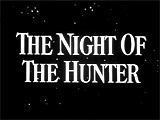


The Night of the Hunter (1955), 93 minutes, D: Charles Laughton
The only film directed by actor and stage director Charles Laughton. A stark, film noirish, black-and-white thriller, with a haunting, chilling lead performance by Robert Mitchum as crazed psychopathic Preacher Harry Powell prowling the Ohio River Valley. He personifies one polar end of the struggle between good and evil The killer of rich widows, with tattoos of LOVE and HATE on the fingers of both hands, weds a dead condemned killer's lonely widow (Shelley Winters), and then relentlessly hunts his own innocent step-children across the Depression Era Bible Belt to get at their father's stolen fortune of $10,000. The final segment pits the Preacher against Lillian Gish as a symbol of protecting Goodness, rocking at night on a porch with a shotgun across her lap, while he sings his perverse hymn in counterpoint: "Leaning on the Everlasting Arms." Unbelievably not nominated for any Academy Awards.


Oklahoma! (1955), 145 minutes, D: Fred Zinnemann


Ordet (1955, Denm.) (aka The World), 126 minutes, D: Carl Theodor Dreyer
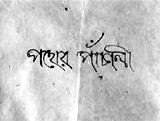
Pather Panchali (1955, India) (aka Father Panchali), 115 minutes, D: Satyajit Ray



The Phenix City Story (1955), 100 minutes, D: Phil Karlson


Picnic (1955), 115 minutes, D: Joshua Logan


Rebel Without a Cause (1955), 111 minutes, D: Nicholas Ray
The classic, melodramatic film that made James Dean an anti-hero icon for generations to come - this was the second of his three films and the best 50s film of its kind regarding the generation gap. A story of rebellion and angst in the life of an unsettled, teenaged, new-kid-in-town Jim Stark (James Dean) who crosses paths with two other alienated, misfit youth - Judy (Natalie Wood) and Plato (Sal Mineo) - at a police station in the first sequence. The outcast trio of juveniles forms a strong bond against both their insensitive parents (completely unjust, dysfunctional, ineffectual, or callous) and their peers, and search for their identities. After a deadly drag race and a confrontation with his milquetoast father (Jim Backus), Jim spends the night with Judy and Plato in a deserted mansion. The adolescents find refuge and solace in their own company. In the tragic finale, Plato is killed by police when he foolishly brandishes an unloaded gun.



Richard III (1955, UK), 161 minutes, D: Laurence Olivier




The Rose Tattoo (1955), 117 minutes, D: Daniel Mann


The Seven Year Itch (1955), 105 minutes, D: Billy Wilder



Smiles of a Summer Night (1955, Swed.) (aka Sommarnattens Leende), 108 minutes, D: Ingmar Bergman


Summertime (1955, UK/US), 100 minutes, D: David Lean
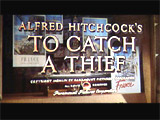



To Catch a Thief (1955), 103 minutes, D: Alfred Hitchcock


Trial (1955), 105 minutes, D: Mark Robson
The film, set in the late 1940s, opened during a nighttime scene at a San Juno private beach, where - after a female's scream, Mexican-American teenager Angel Chavez (Rafael Campos) was found standing over the deceased female, Marie Wiltse, who had died of heart failure. Chavez was arrested on suspicion of statutory rape, and charged with first-degree felony murder. Meanwhile, California law school professor David Blake (Glenn Ford) was threatened with losing his job unless he could acquire trial experience (a new prerequisite) over the summer. Blake was hired by communist shark/attorney Barney Castle (Arthur Kennedy) to take the Chavez case. Castle bribed racist courthouse jail-sheriff 'Fats' Sanders (Robert Middleton) with $20 to speak to the incarcerated Chavez (and his mother Consuela (Katy Jurado)). Although Chavez admitted making love to Willsey, angering Castle for his forthrightness, he claimed he was innocent of murder charges. The two were persuaded to retain him as their representative for the racially-charged felony murder case. During his preparation for the trial, Blake was aided by Castle's secretary Abbe Nyle (Dorothy McGuire), a love interest. To raise funds for the defense (and for himself) in the sensationalist case, Castle held a successful New York fund-raising rally sponsored by the All Peoples Party - a Communist front, that raised $320,000. The San Juno trial was presided over by black Judge Theodore Motley (Juano Hernandez), and the DA was Jack Armstrong (John Hodiak). As the trial was commencing, process server Finn (Elisha Cook Jr.) subpoened Blake to appear before the House Un-American Activities Committee the following Saturday for his involvement in the New York rally. A jury was finally selected after three weeks, when novice lawyer Blake had to throw out the original jury panel because they had been interrogated by the police before the trial. The atmosphere of the trial was tense, due to white supremacists and other lynch mob members who were rallying to put Latino Chavez away. The DA's first witness was Marie's physician from childhood, Dr. Schacter (Richard Gaines), who testified that Marie died of violent exertion to her heart, due to a history of rheumatic fever. Blake's cross-examination revealed that she was at risk of dying at any time. Another witness' testimony about clearly seeing the beach incident with his car's spotlight was debunked. Blake fired Castle as defense attorney when he insisted that Angel take the stand. However, Angel was called to the stand, where his testimony under cross-examination was self-damning. He claimed he didn't know about Marie's ripped dress, why he left the scene, or how to have sex. The jury ruled against Angel and he was convicted of the crime of felony murder. During the sentencing hearing, the prejudiced Castle proposed a mandatory death penalty (to make Chavez a martyr for his political cause), while Blake found an obscure code statute requiring that the juvenile be sent to the state's industrial reform school. The judge sentenced Castle to 30 days in jail for contempt of court.